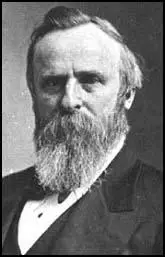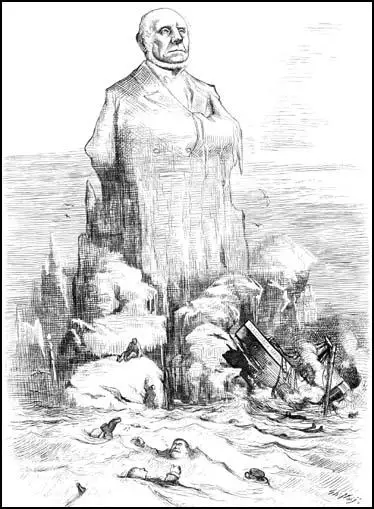Rutherford Hayes

Rutherford Hayes was born in Delaware, Ohio, on 4th October, 1822. Educated at Harvard Law School, he worked as a lawyer in Cincinnati, where he obtained a reputation for being willing to defend fugitive-slave cases.
During the Civil War he served in the Union Army and reached the rank of major general. Hayes, member of the Republican Party, he was elected to Congress in 1865. He also served as governor of Ohio (1868-72 and 1876-77).
In 1876 Hayes was nominated as the Republican presidential candidate. The party had been hurt by the scandals during the presidency of Ulysses S. Grant (1869-77) and were attracted by Hayes's clean record in government. His Democratic Party opponent, Samuel Tilden, also had an impressive background, and during the election the Republican supporting Thomas Nast, produced a series of cartoons attacking him. This helped to undermine the Democrats campaign but early returns suggested a Tilden victory and the first Democratic president since the American Civil War. When the votes were counted Tilden (4,284,757) had won 51% of the vote, against 48% for Hayes (4,033,950).
After the election the Republican Party challenged the validity of the voting in South Carolina, Florida and Louisiana. These three southern states were still under post-war military occupation, and over the next few days votes for Tilden were disqualified shifting the majority to Hayes. Members of the Democratic Party were furious and many refused to accept the new voting figures. Florida sent two rival sets of electors to the electoral college and left it to Congress to decide who should become president.
Congress was itself split with the Senate being controlled by Republicans and the House of Representatives by the Democrats. In an attempt to solve the problem both houses agreed to set up a special Electoral Commission of 15 senators, representatives and supreme court justices. In an attempt to produce a non-partisan decision, it was agreed to appoint seven Republicans, seven Democrats, and one independent justice to the commission. However, at the last moment the independent justice was offered a senate seat in Illinois and was replaced by a supporter of the Republican Party.
During the investigation by the commission some voters claimed they had been physically intimidated during the election. The committee also discovered several cases of fraud including attempts to destroy ballot papers. However, at the end of the investigation, all members of the commission voted on party lines and Hayes was given the electoral votes for all three states. Hayes was therefore elected with 185 electoral votes to Tilden's 184.
Leaders of the Democratic Party continued to challenge the election result. Further negotiations took place and it was eventually agreed that Samuel Tilden would accept the result in return for federal troops being removed from southern states. This decision enabled the whites to regain the political control of the South that they had lost at the end of the American Civil War. In most of these states Black Codes were reintroduced and a large percentage of African Americans lost the right to vote in future elections.
Many people believed that Hayes did not deserve to be president and during his period in office he became known as "Mr. Fraudulency". Hayes also upset the trade union movement by sending federal troops against railroad strikers in 1877. He also angered party bosses by reforming the civil service by replacing political patronage with nonpartisan examinations.
The main political issue during his term of office concerned silver coinage. After the discovery of new deposits of silver in Nevada, Colorado and Utah, some political figures began to urge an increase in the production of silver coins. Hayes argued against the move claiming it would result in higher inflation. In 1877 Richard Bland of Missouri introduced a bill that provided for a dramatic increase in silver coinage. This bill was eventually amended and was passed despite attempts by Hayes to have the act vetoed.
Hayes refused renomination by the Republican Party in 1880. In retirement, Hayes worked for humanitarian causes, especially prison reform. Rutherford Hayes died in Fremont, Ohio, on 17th January, 1893.

Harper's Weekly (21st October, 1876)
